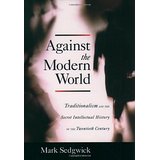
Against the Modern World is the first history of Traditionalism, an influential yet surprisingly little-known twentieth century anti-modernist movement. Involving a number of important, yet often secret, religious groups in the West and Islamic world, it affected mainstream and radical politics in Europe and religious studies in the United States.
Emerging from the 'discovery' in the West of non-Western religious writings, at a time in the nineteenth century when progressive intellectuals had lost faith in the ability of Christianity to deliver religious and spiritual truth, it was fuelled by the widespread religious scepticism that followed World War I. It found its voice in René Guénon, a French writer who rejected modernity as a dark age, and sought to reconstruct the Perennial Philosophy - the fundamental truth uniting all the world's religions.
Mark Sedgwick reveals how this pervasive intellectual movement helped shape major events in twentieth century religious life, politics and scholarship - all the while remaining invisible to outsiders.
Order paperback for US $24.60
Order hardback for US $61.00
Order paperback for UK £18.49
Order hardback for UK £39.00
A narrative that stands out for both the density of its factual material and the quality of its style... This might be one of the most fascinating books in the history of ideas published in recent years.
–Andreas Umland, in Patterns of Proejudice.
Against the Modern World is a genuinely startling book. In this massively researched and clearly written study, Mark Sedgwick seeks nothing less than to provide an alternative intellectual history of the twentieth century. Time and again, he offers unexpected connections, stresses the importance of forgotten or underestimated thinkers, and throws new light on the history of esoteric thought and religion. A wonderful contribution.
–Philip Jenkins, author of The Next Christendom: the Coming of Global Christianity.
Mark Sedgwick shows how Traditionalism is a major influence on religion, politics, even international relations. Famous scholars, theosophists and masons, Gnostic ascetics and Sufi sheikhs, jostle with neo-fascists, terrorists and Islamists in their defection from a secular, materialist West. As a study of esotericism and Western images of the East, Against the Modern World compares in importance with Edward Said's monumental Orientalism . Likewise, it deserves the widest readership.
–Nicholas Goodrick-Clarke, author of Black Sun and The Occult Roots of Nazism.
This is an invaluable contribution to an ongoing and increasingly sophisticated discussion about modernity, the professional study of religion, and the religions themselves. What sets Sedgwick's narrative apart from most all previous accounts is his remarkable historical sweep (from the Italian Renaissance to today), his impressive grasp of the Muslim world, and, perhaps most of all, the humane grace with which he treats his historical subjects. Here they emerge with both their hearts and their warts intact, neither as intellectual fathers to slay nor as cultural gods to put on the proverbial pedestal, but as human beings struggling with some of the deepest religious problems and promises of our modern world. The result is a reading experience through which one comes to realize, with something of a start, that their story happens also to be ours.
–Jeffrey J. Kripal, author of Roads of Excess, Palaces of Wisdom: Eroticism and Reflexivity in the Study of Mysticism.
Une étude très sérieuse, remarquablement documentée sur certains points, concernant au premier chef, Guénon, Schuon et les tenants de ce néo-traditionalisme qu'ils ont inspiré et qui a fleuri entre les deux guerres mondiales pour s'épanouir dans les années cinquante jusqu'à nos jours. Le ton est agréable, maniant l'ironie avec à propos et alternant les analyses de fond avec des récits d'interview et de rencontres telles qu'un journaliste anglo-saxon pourrait les présenter à un public lettré.
– Politica Hermetica.
Le livre de Mark Sedgwick offre en effet une analyse approfondie de ce courant intellectuel si peu connu. Ce regard original nourri d'une connaissance étendue de l'islam et du monde musulman ne peut qu' tre bénéfique à une prise de conscience de l'impact du traditionalisme hors des pays occidentaux.
– Cahiers du monde russe.
I The Development of Traditionalism
1 Traditionalism
2 Perennialism
3 Gnostics, Taoists and Sufis
II Traditionalism in Practice
4 Cairo, Mostaganem and Basel
5 Fascism
6 Fragmentation
III Traditionalism at Large
7 The Maryamiyya
8 America
9 Terror in Italy
10 Education
IV Traditionalism and the Future
11 Europe after 1968
12 Neo-Eurasianism in Russia
13 The Islamic World
14 Against the Stream